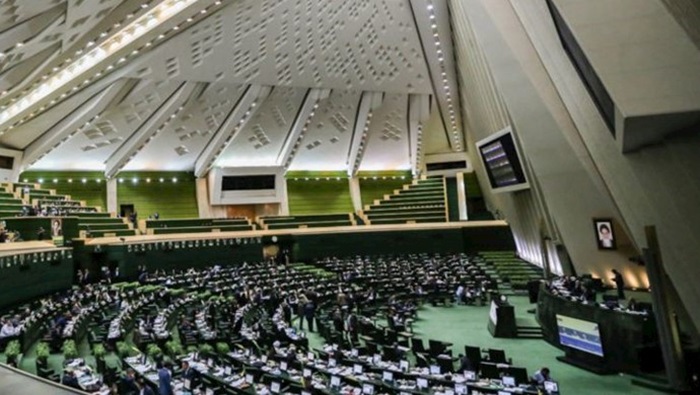
In a startling turn of events, the Iranian regime has temporarily shut down the Majlis (parliament) following the leak of confidential documents by a dissident group, casting a shadow over the government’s transparency and operational integrity.
The closure, announced to last until March 4, comes at a critical juncture as the Majlis faces delays in its public sessions, particularly the review and approval of the annual budget bill, a cornerstone of the regime’s legislative agenda.
According to the state-run Tabnak newspaper, Speaker Mohammad Bagher Ghalibaf stated that the public sessions of the Majlis would be postponed until after the elections. He added, however, that a session could convene to amend resolutions of the budget bill if necessary. This delay is significant given the budget bill’s central role in the regime’s media focus and the ongoing conflict between the Majlis and the government.
The closure arrives amidst heated debates on the budget, with the reviewing and approval process still unresolved. The budget bill, crucial for the regime’s operations, must be approved before early March, making the timing of the Majlis’s suspension particularly impactful. The leaked documents reveal a deeper issue: major decisions are often dictated by supreme leader Ali Khamenei through government decrees, rendering the Majlis and its procedures a mere formality. This practice underscores a systemic lack of meaningful legislative debate, with members often rubber-stamping Khamenei’s directives without question.
The state-run Etemad newspaper highlighted concerns over the country’s electoral integrity, suggesting that recent disqualifications and manipulations by the Guardian Council and the Majlis undermine the very concept of elections, reducing them to superficial exercises devoid of substantive democratic engagement.
This crisis of legitimacy extends beyond the legislature to encompass the executive and judicial branches of the Iranian regime. The judiciary has increasingly become an instrument of persecution, while government ministries operate under the heavy influence of the Supreme Leader, the Islamic Revolutionary Guard Corps (IRGC), and the Ministry of Intelligence. A confidential letter from Foreign Minister Hossein Amir Abdollahian to Khamenei, disclosed in the leak, lamented the lack of coordination in foreign policy actions, highlighting the fragmented nature of governance and the weakening of the Ministry of Foreign Affairs.
The revelation of these documents not only exposes the autocratic underpinnings of the Iranian regime but also underscores a broader crisis of governance where key institutions function as extensions of authoritarian control rather than independent entities serving the public interest. As Iran grapples with internal dissent and a clamor for reform, the current situation underscores the urgent need for transparency, accountability, and genuine democratic reform within the country’s political landscape. The path forward remains uncertain, with the regime’s legitimacy and stability at stake amid growing calls for change from within Iran and the international community.

MEK Iran (follow us on Twitter and Facebook), Maryam Rajavi’s on her site, Twitter & Facebook, NCRI (Twitter & Facebook), and People’s Mojahedin Organization of Iran – MEK IRAN – YouTu
